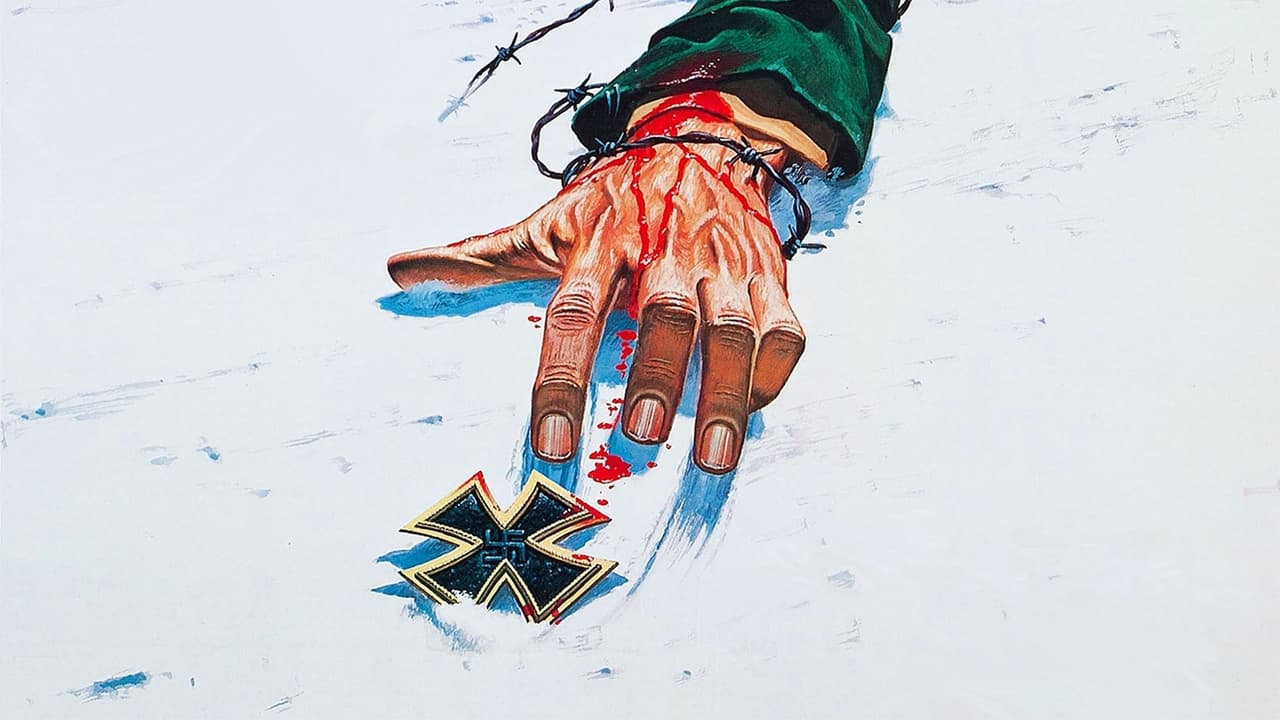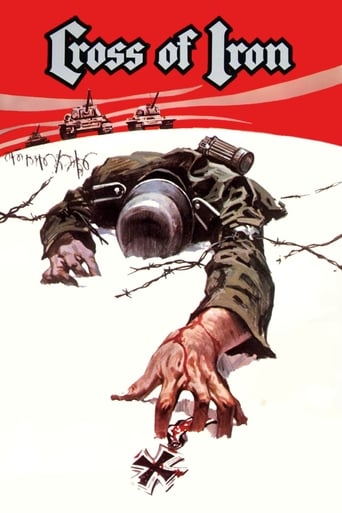ReaderKenka
Let's be realistic.
Orla Zuniga
It is interesting even when nothing much happens, which is for most of its 3-hour running time. Read full review
Kimball
Exactly the movie you think it is, but not the movie you want it to be.
cinemajesty
Film Review: "Cross of Iron" (1977)From the director Sam Peckinpah (1925-1984), responsible for the outstanding western "The Wild Bunch" from the year 1969, comes this World War II movie told from the perspective of German officer Rolf Steiner, portrayed by remorseless striving perfectly-cast actor James Coburn (1928-2002), leading his platoon through the ambushing Eastern borderlands. Actor Maximilian Schell (1930-2014) as his commanding supervisor, as well as match-making cast Hauptmann Stransky, sitting in the bunker near the radio in order to direct the hopelessly front-running at the Russian frontier of year season 1942/1943. The screenplay based on a war-digesting book by Willie Heinrich (1920-2005) has been in creative hands with director Sam Peckinpah, who indulges on his trademark directions in-production with slow-motion action shots of blood and dirt-sprinkling proportions and in post-production daring editorial shot combinations that "Cross of Iron" stands out in the crowd of War movies, again a picture to be discovered with younger audiences to comprehend horrors of war and the consequences every man has to encounter in the aftermath; precisely captured by the director with the eventually consolidated main characters in battle stating final words of forfeited fighting with Stransky saying "I will show you how Prussian officers fight" in which Steiner coolly replies "And I will show you where the Iron Crosses grow."© 2017 Felix Alexander Dausend (Cinemajesty Entertainments LLC)
SnoopyStyle
It's 1943 at the Russian front and the Germans are losing. Rolf Steiner (James Coburn) is a superior soldier and leader of men. Aristocratic Captain Stransky (Maximilian Schell) is the arrogant true-believer new commander. During a bloody battle, the brave Lieutenant Meyer dies leading a heroic counter attack while Steiner is injured and Stransky bumbles in his bunker. The ambitious Stransky claims the counter attack as his own and requests the Iron Cross giving Steiner and the homosexual Lieutenant Triebig as witnesses. After a stay in a hospital, Steiner returns to the front unexpectedly and refuses to lie for Stransky. The order comes to evacuate but Stransky deliberately leaves Steiner and his platoon behind.Director Sam Peckinpah brings alive the war action. The story behind the action is compelling but it is the action that is exceptional. Peckinpah lets loose with an orgy of muddy explosive violence. The war action is relentless. Coburn is terrific as the leader of men. There are memorable sections like the female Russian squad. This follows the great tradition of anti-war movie.
Adam Peters
(64%) A raw slice of second world war carnage from director Sam Peckinpah that very nearly dances its way toward being a wartime exploitation flick, but due to the fact that it is so well made, strongly acted, and grippingly intense that it never drops fully down to such trashy levels. The viewpoint is taken from the eyes of the Nazi fighters, made up from an international cast of actors, battling and losing, against the Soviets during one of the final parts of the war. James Coburn leads well despite never truly feeling like the character he plays, but the action is harsh and bloody with fantastically well shot battles as this tries, and largely succeeds, to bring the horror of war to life. Despite the so-so ending, this is worth a look for both war, and Peckinpah fans alike.
Robert J. Maxwell
Sam Pekinpaugh has given us a big war-time movie situated on the Russian front, starring James Coburn as the savvy and taciturn Sgt. Steiner and Maximilian Schell as the newly arrived, dapper, Junker aristo, eager for the Iron Cross, the decoration given only for heroism in battle. It has Pekinpaugh's signature on it -- an abundance of painful deaths, more explosions than have ever before been committed to celluloid, and all in slow motion. The story is such that, if it weren't for some cogent lines, it could have been directed by Sam Fuller.I'll give one example of what I thought was a good line. At the end, both Coburn and Schell stand face to face, armed, and about to be overwhelmed and killed by the onrushing Russians. It's only a brief pause, but Schell admits his status still requires the winning of the Iron Cross. "You come with me," says Coburn, "and I'll show you where the crosses of iron are." It's neat because by a simple transposition of words within the phrase, Coburn has turned a medal (the Iron Cross) into a grave marker (crosses of iron). It has its weaknesses. It's really too long and too loose-limbed for what it has to say. As Steiner, Coburn is a monument to military perfection, while Schell is a stereotypical cowardly and spiteful traitor. Coburn does well enough by the role of the humanitarian but dedicated sergeant. Schell is a marvelous actor but he has only one scene in which he's able to put his chops on display -- when he tricks a subordinate into admitting that he prefers the company of men to women. "He said YES! He said YES!" Schell is in a transport of delight at having finagled his subordinate into a possible admission of homosexuality which, as far as we can tell, isn't true. The effect, though, is to make the subordinate a compliant slave.It's not a bad film in any way but it lacks poetry of any kind. Pekinpah by this time in his career was describing himself as "a functioning alcoholic." He's lucky he got it out at all.

